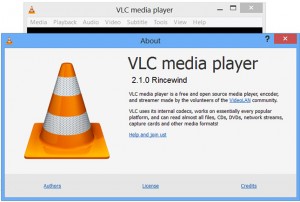VideoLAN Releases VLC Media Player 2.1 With Hardware Decoding and Encoding!
After two years of work the VideoLAN team today announced the release of VLC 2.1 Rincewind! With a new audio core, hardware decoding and encoding, port to mobile platforms, preparation for Ultra-HD video and a special care to support more formats, 2.1 is a major upgrade for VLC.

Rincewind has a new rendering pipeline for audio, with better effiency, volume and device management, to improve VLC audio support. The key feature is that Rincewind brings hardware assisted video decoding and encoding to OS X 10.6+, Android Jelly Bean and GNU/Linux platforms and Windows PC hardware. This is good news for the millions of people that use Intel HD Graphics with QuickSyncVideo Encoding (Intel Media SDK) as this build gives you hardware support. If that doesn’t do it for you, VLC Media Player 2.1.0 Rincewind fixes around a thousand bugs, so that in itself is the only reason you need to update.
You can find out more about VLC 2.1 and download the 32-bit version here. If you are looking for the 64-bit version you won’t find it on the standard download page, but we managed to find it on this page.
VLC 2.1 Features
- Rewritten audio core, allowing better volume and device management.
- Rewrite of the audio modules, to adapt to the new core.
- Correct support for multi-channel layouts in all formats: 5.1, 6.1 and 7.1
- New audio outputs for Windows Vista, Android, iOS, OpenBSD and OSSv4.
- New remapping, gain, stereo widening, downmixing effects.
- Higher samplerate, precision, live configuration in the core.
- Numerous new audio metadata format supported.
- Port the OpenGL output to OpenGL ES.
- Support color conversion shaders in glsl on Android and iOS.
- New outputs for OpenMax IL on mobile and Decklink Blackmagic.
- New video outputs for iOS using OpenGL ES2.
- Support for deinterlacing for higher bit depth and XYZ colorspace.
- New anaglyph filter for side-by-side 3D.
- 4K-ready �
- Add hardware decoding for OS X using VDADecoder.
- Add hardware decoding for Android using MediaCodec.
- Add hardware decoding for GNU/Linux using VDPAU.
- Add hardware encoding for Windows using Intel QuickSyncVideo.
- Support for G2M4, MSS1, MSS2, TSCC2, CDXL, Ut, VBLE video codecs.
- Support for Ulead DV audio, Indeo Audio Coder, RealAudio Lossless audio.
- Support for SCTE-27 and complete EIA-608 subtitles.
